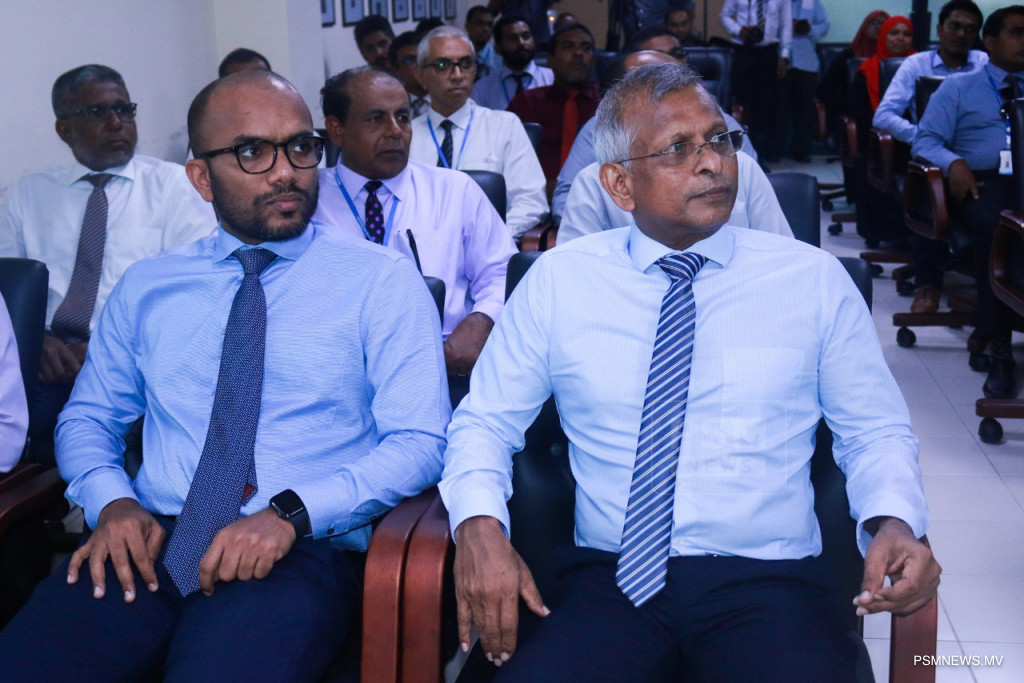Malé, Maldives – Governor of Maldives Monetary Authority (MMA), Ali Hashim has said that all transactions done within Maldives will be made in Maldivian Rufiya (MVR) after the central banks payment system is introduced.
Speaking at the parliament committee on public accounts, Governor Hashim told that once the payment system is introduced, that the central bank will make it mandatory for all payments such as payments for products or services and rent should be made in MVR.
Governor Hashim also pointed out that even though the current guidelines and regulations stipulate for payments to be made in MVR, there was no proper mechanism for monitoring and that with the payment gateway this would be solved as well.
Speaking on controlling the price of American Dollar (USD) in the Maldives, Governor stated that the implementation of regulations for it will be carried out slowly while monitoring the impacts it has on the overall economy of the country. He also added that the central bank would enforce that all transactions made in the country to be done in MVR to maintain the exchange rate of the country. In addition to this, all transfers from one account to the other would also be required to be made in MVR.
Governor also added that before the implementation of all such regulations, that the central bank would carry out awareness programs to the general public.
Governor Hashim’s comments on the matter comes while Maldives Monetary Authority (MMA) had issued a notice to all banks operating in Maldives to stop card transactions made in USD within the country.
In the memo sent out by MMA to the banks, it states that all banks are required to stop USD transaction made with their VISA cards within the country from April 15, 2021 onward. It also stated that all payments made to restaurants, guest houses and resorts should also be made in Maldivian Rufiyaa from then onward.
The central banks decision comes while a bill had been presented to the parliament to ensure USD income benefits the state and also while the government had announced plans for lowering the use of USD within the country amid the shortages of USD which has caused inflation within the country.
Maldives Monetory Authority (MMA) had signed an agreement with the subsidiary company of TietoEVRY, Tieto Latvia SIA to implement the Instant Payment System in Maldives on October 28, 2020.
The Instant Payment System implementation agreement was signed under the Maldives Payment System Development Project of MMA. MMA stated that this has been a major national-level initiative to transform the payments landscape of the Maldives.
With the successful implementation of the system, MMA has told that it would enable users to make and receive payments in real-time, irrespective of the island they live on or where they bank. This system would also facilitate the introduction of innovative payment solutions to the market by Payment Service Providers, connected via a single platform.
MMA also added that this marked a notable milestone for the Maldivians, and a significant steppingstone for the economy as a whole to capitalize on the developments in financial technology taking place around the world and facilitate the introduction of modern, digital payment solutions to the market.
Speaking at the agreement signing ceremony, Governor of Maldives Monetary Authority, Ali Hashim had said that this was an important step being taken towards the advancement of the Maldivian payments landscape, in line with those of the developed economies of the world. He also added that they expect his system to address the various challenges being faced by the Maldivians within the existing payments system.
According to MMA the Instant Payment solution of TietoEVRY is scalable and simple to configure, allowing to easily expand the product range. MMA also added that the platform is based on micro-services architecture and enables the freedom to independently develop and deploy new services.
MMA Had previously told that this project would result in the Maldivian payments infrastructure being developed and enhanced to the levels and standards set by major economies. The system is expected to go-live and be in use for domestic transactions by the last quarter of 2021.





